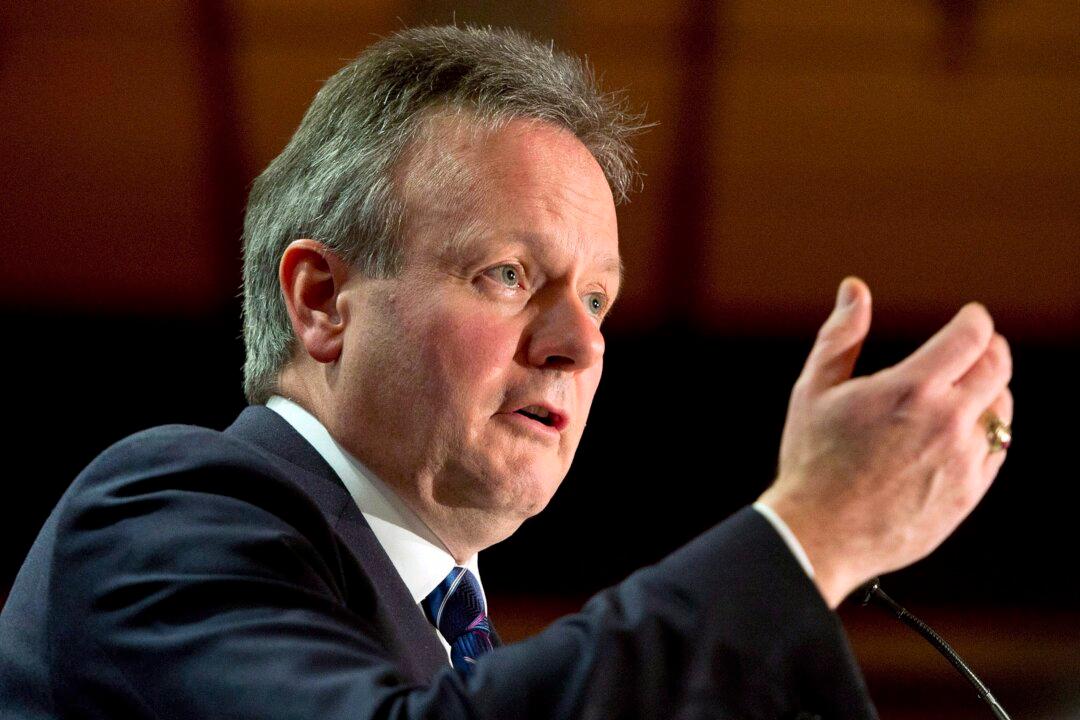TORONTO—Bank of Canada governor Stephen Poloz has cited “underperforming” inflation and a slow rebound in exports among his major concerns for the economy.
“I would say I’m most worried about inflation and how it’s underperforming all of our models,” Poloz said in an interview aired Tuesday on CBC’s “The Lang and O’Leary Exchange.”
“It’s a difficult one to explain right now and that always makes you worried,” said Poloz, who added that the prospect of deflation in Canada was “very unlikely,” but something the bank was watching since inflation has remained so much below its target of two percent.
Poloz said he expects long-term interest rates to rise in response to tapering by the U.S. Federal Reserve.
The U.S. central bank has already decided to reduce its $85 billion a month of bond purchases by $10 billion and says it will monitor economic conditions, particularly U.S. employment, in making further decisions.
Poloz says Fed tapering will inevitably put pressure on Canadian bond yields, likely leading to an increase in long-term fixed mortgage rates even if the Bank of Canada does not increase its benchmark rate.
However, that should not greatly hurt the Canadian economy since the housing market already appears to be heading for a soft landing, he said.
Meanwhile, Poloz did not appear in any hurry to raise the Bank of Canada’s trend-setting rate and denied when asked whether he was under international pressure to raise rates.
“No, I wouldn’t use the term pressure,” he said, “but I think there may be, in the context of firming global economies, especially the U.S., we would expect to see some upward pressure on market interest rates, long-term rates in particular, which of course is where the quantitative easing had its primary effect.”
Federal Finance Minister Jim Flaherty, whose department works closely with the central bank, suggested in a recent interview that there would be such pressure as a result of Fed tapering.
“And the OECD and the IMF have both said to Canada [that] we ought to let our interest rates go up a bit,” Flaherty said on CTV’s Question Period.
However, Poloz noted the difference between the effects of tapering on market rates and “the front end, where we operate.”
“It will still be up to us what our monetary policy should be independently of what is going on in the U.S. and that will depend on where is inflation relative to where we expect it to be. And right now it’s expected to be too low for too long so that’s where we sit.”
Meanwhile, Poloz indicated the bank was looking for exports to replace consumer spending as a driver in the growth of the economy.
“Actions we have taken over the last five years has encouraged consumer spending to rise and that’s where we got the extra spending that we needed to replace all the exports that we lost,” he said.
“And so, in that sense it was a good trade for the economy and now it’s time for that to reverse itself so households can stop borrowing [excessively] … while the export side strengthens.”
However, he conceded there remain “question marks” on the export side, a fact underlined in Tuesday’s merchandise trade report which showed Canada’s trade deficit with the world went to $940 million in November from $908 million in October. The gap widened as imports rose to $40.7 billion while exports remained unchanged at $39.8 billion.
“Something fundamental has changed,” Poloz said. “Exports are not behaving according to our models right now, so we are researching that very diligently.”
Poloz noted that since the Great Recession there has been a change in the competitive landscape, with countries like Mexico and China now competing for export business that was previously the preserve of Canadian companies.
Other issues include the fact that a number of exporters went out of business during the recession and others were forced to downsize and have not yet re-expanded.
“But the tail wind does appear to be increasing from the U.S., so that’s the most important ingredient,” he said.
With files from The Canadian Press
Poloz Concerned About Low Inflation, Behaviour of Exports
Improving U.S. economy a ‘tail wind’ for Canada
Bank of Canada governor Stephen Poloz has cited “underperforming” inflation and a slow rebound in exports among his major concerns for the economy.

File photo of Bank of Canada Governor Stephen Poloz speaking to the Canadian Club in Montreal on Dec. 12, 2013. Poloz discussed his concerns on the Canadian economy with the CBC on Jan. 7, 2014, in Toronto. Ryan Remiorz/The Canadian Press
|Updated:




